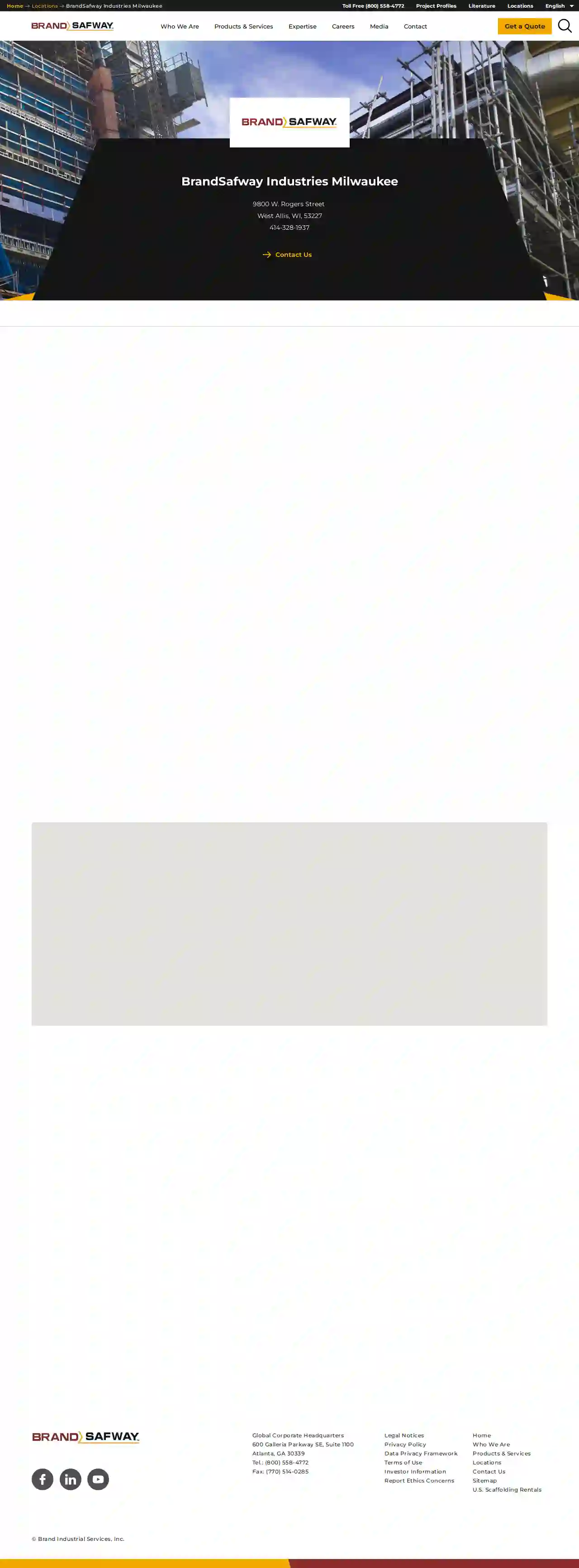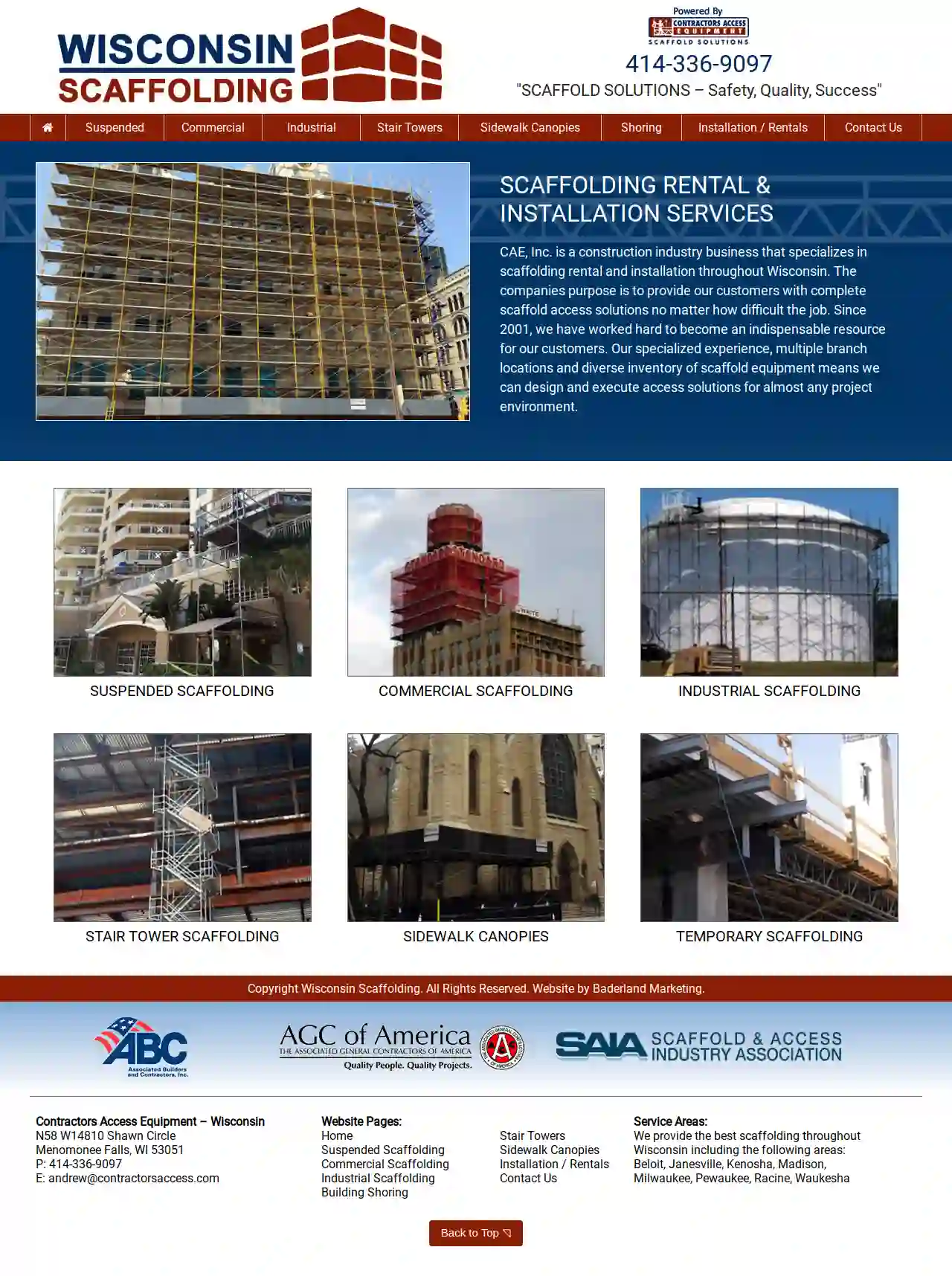Scaffolding Companies Rib Mountain
Find top Construction Scaffolding in Rib Mountain
Receive up to 3 Construction Scaffolding quotes for your project today! Compare profiles, reviews, accreditations, portfolio, etc... and choose the best deal.

API Construction
51 reviews2725 S 163rd Street, New Berlin, 53151, USAPi Construction is a trusted scaffold and high-reach equipment expert in Milwaukee, Wisconsin. We provide safe, reliable, and high-quality access equipment, scaffold, accessories, and safety training for contractors. Our commitment to safety is the essence of how we perform our best and safest projects. We believe that zero injuries are achievable and the expectation of our company. We offer a variety of scaffold rental and expert design solutions, including custom-engineered scaffold solutions with erection and dismantle services. Our team of skilled scaffold engineers and designers provides total end-to-end support of your scaffold requirements, no matter the project scope. We are proud to be powered by the APi Group and are ready to serve your projects in Wisconsin and the surrounding area.
- Services
- Why Us?
- Accreditations
- Our Team
- Gallery
Get Quote
Badger Ladder LLC
4.637 reviewsMilwaukee, USBadger Ladder is a trusted supplier of scaffolding for sale, ladders, and pump jacks, with nearly 30 years of industry experience. Our scaffolding products offer customizable heights for easier access to difficult areas, and are built to last. We provide various types of scaffolding, including cross braces, stacking pins, and scaffold planks to meet all your project needs. Our scaffolding for sale online offers the advantages of powder-coat paint, preventing rust, and a cope-welded design for enhanced strength. Designed to meet the demands of any workload, our scaffolding is suitable for both interior and exterior use.
- Services
- Why Us?
- Gallery
Get Quote
BrandSafway Industries Milwaukee
410 reviews1234 Industrial Drive, Milwaukee, 53203, USBrandSafway is a leading provider of access solutions, including scaffolding, aerial work platforms, and forming and shoring. With a strong commitment to safety, quality, and customer satisfaction, BrandSafway offers a wide range of services tailored to meet the unique needs of clients across various industries. Their team of experienced professionals works closely with clients to understand their requirements and deliver customized solutions that enhance efficiency and productivity. BrandSafway is dedicated to providing innovative access solutions that ensure safe and efficient project execution.
- Services
- Why Us?
- Accreditations
- Our Team
- Testimonials
Get Quote
Wisconsin Scaffolding
Menomonee Falls, WI, N58 W14810 Shawn Circle, 53051, USContractors Access Equipment, Inc. (CAE) is a construction industry business specializing in scaffolding rental and installation throughout Wisconsin. Since 2001, CAE has worked hard to become an indispensable resource for customers. With specialized experience, multiple branch locations, and a diverse inventory of scaffold equipment, CAE can design and execute access solutions for almost any project environment. CAE provides the best scaffolding throughout Wisconsin, including Beloit, Janesville, Kenosha, Madison, Milwaukee, Pewaukee, Racine, and Waukesha.
- Services
- Why Us?
- Accreditations
- Our Team
- Testimonials
- Gallery
Get Quote- Br
BrandSafway Industries Wisconsin Rapids
44 reviewsMilwaukee, US- Services
- Why Us?
Get Quote
Over 2,353+ Scaffolding Businesses on our directory
Our scaffolding companies operate in Rib Mountain & surroundings!
ScaffoldingHQ has curated and vetted the Best Scaffolding Businesses in and around Rib Mountain. Find a top & reliable contractor today.
Frequently Asked Questions About Scaffolding Companies
- Experience: 'How long have you been in business, and what experience do you have with projects like mine?'
- Licensing and Insurance: 'Are you fully licensed and insured, and can I see proof of coverage?'
- Safety Record: 'What are your safety procedures, and how do you ensure worker safety on the job site?'
- References: 'Can you provide references from previous clients?'
- Quotes and Costs: 'Can you provide a detailed quote that outlines all costs, including materials, labor, and any additional services?'
- Project Timeline: 'What is the estimated timeframe for scaffolding erection and dismantling?'
- Communication: 'How will you communicate with me throughout the project?'
- Regulations: Local regulations often specify minimum inspection intervals.
- Project Type and Duration: Long-term projects or those in challenging environments may require more frequent inspections.
- Weather Conditions: Severe weather (storms, high winds) can necessitate additional inspections.
- Any Alterations or Modifications: Any changes to the scaffolding structure require re-inspection.
- Tube and Clamp Scaffolding: A traditional and versatile system using individual tubes and clamps. It's highly adaptable but requires more time to erect.
- System Scaffolding: Pre-engineered systems with modular components that fit together quickly. They offer speed and efficiency, especially for larger projects.
- Suspended Scaffolding: Hung from a roof or overhead structure, ideal for high-rise buildings or areas with limited ground access.
- Mobile Scaffolding: Mounted on wheels, allowing easy movement around a worksite. Suitable for tasks like painting or plastering.
- Specialized Scaffolding: Cantilever scaffolding, rolling towers, and other specialized systems cater to specific needs.
- Encroaches onto public property (sidewalks, roads): Permits are usually needed from the local council or highway authority.
- Exceeds a certain height: Scaffolding above a specified height often requires a permit.
- Is erected in a conservation area or near a listed building: Special considerations and permits may apply.
What questions should I ask a scaffolding company before hiring them?
How often should scaffolding be inspected?
What are the different types of scaffolding?
Do I need a permit for scaffolding in the USA?
What questions should I ask a scaffolding company before hiring them?
- Experience: 'How long have you been in business, and what experience do you have with projects like mine?'
- Licensing and Insurance: 'Are you fully licensed and insured, and can I see proof of coverage?'
- Safety Record: 'What are your safety procedures, and how do you ensure worker safety on the job site?'
- References: 'Can you provide references from previous clients?'
- Quotes and Costs: 'Can you provide a detailed quote that outlines all costs, including materials, labor, and any additional services?'
- Project Timeline: 'What is the estimated timeframe for scaffolding erection and dismantling?'
- Communication: 'How will you communicate with me throughout the project?'
How often should scaffolding be inspected?
- Regulations: Local regulations often specify minimum inspection intervals.
- Project Type and Duration: Long-term projects or those in challenging environments may require more frequent inspections.
- Weather Conditions: Severe weather (storms, high winds) can necessitate additional inspections.
- Any Alterations or Modifications: Any changes to the scaffolding structure require re-inspection.
What are the different types of scaffolding?
- Tube and Clamp Scaffolding: A traditional and versatile system using individual tubes and clamps. It's highly adaptable but requires more time to erect.
- System Scaffolding: Pre-engineered systems with modular components that fit together quickly. They offer speed and efficiency, especially for larger projects.
- Suspended Scaffolding: Hung from a roof or overhead structure, ideal for high-rise buildings or areas with limited ground access.
- Mobile Scaffolding: Mounted on wheels, allowing easy movement around a worksite. Suitable for tasks like painting or plastering.
- Specialized Scaffolding: Cantilever scaffolding, rolling towers, and other specialized systems cater to specific needs.
Do I need a permit for scaffolding in the USA?
- Encroaches onto public property (sidewalks, roads): Permits are usually needed from the local council or highway authority.
- Exceeds a certain height: Scaffolding above a specified height often requires a permit.
- Is erected in a conservation area or near a listed building: Special considerations and permits may apply.